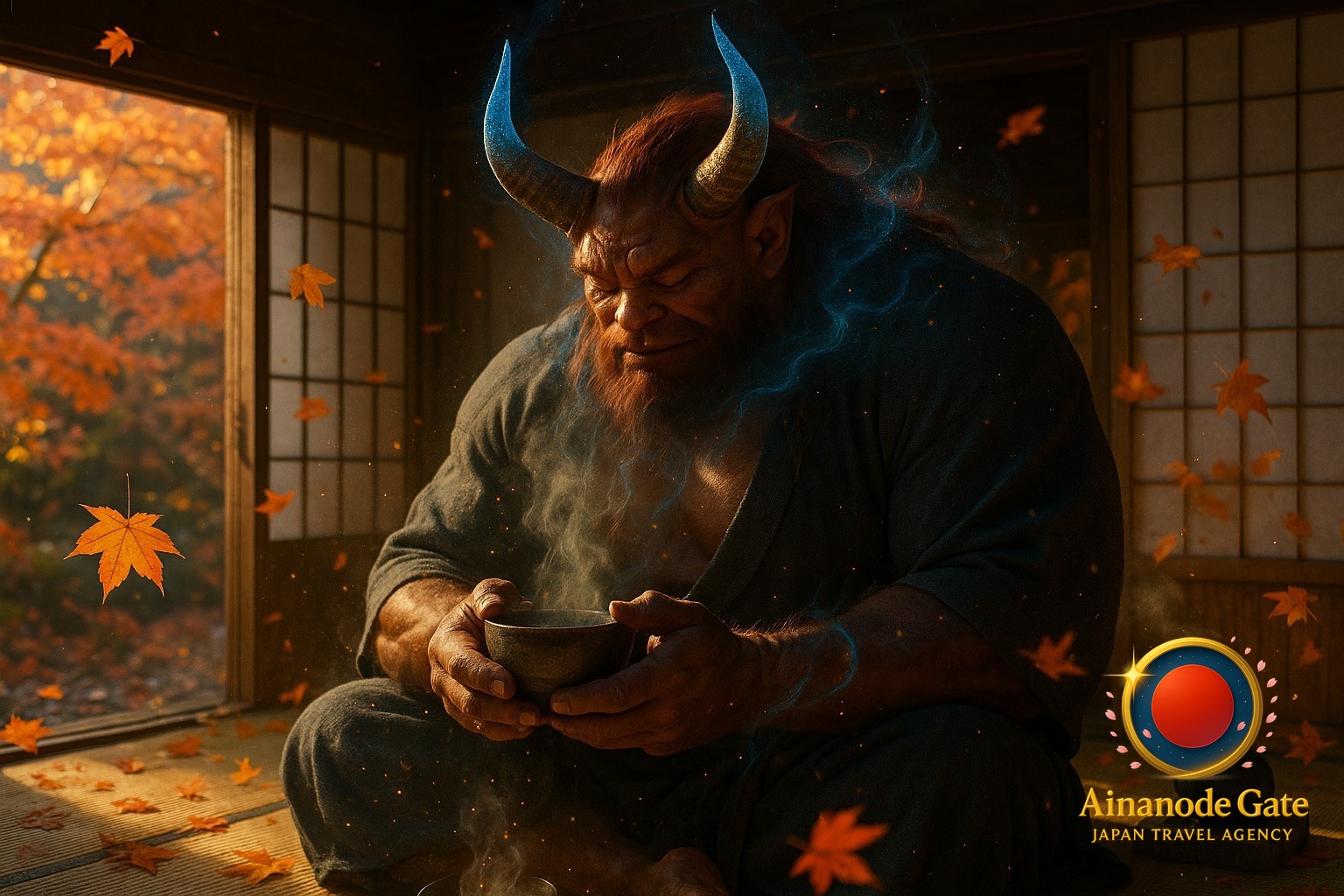Today’s Guest
I met him at the threshold of a quiet tea room in Higashiyama just as the day slipped into the long amber of autumn. A traveler of the Oni Folk, nearly three meters tall, shoulders like carved hills, yet moving with deliberate care so the lintel would not complain. Horns caught the light; a faint blue aura threaded out and back again in slow spirals, like breath learning manners. The host prepared the hearth without comment. In this room, the vocabulary is simple: bow, cleanse, turn, offer, receive. I watched the Oni learn each word with his hands first.
He chuckled, almost embarrassed, when a maple leaf rode a thin current through the open shoji and hovered above his bowl. “The forest follows me,” he said, then corrected himself with a bow. “No—today I follow it.”
First Bow, Then Breath

“Like wearing a river,” he answered. “It is larger than me, yet it asks me to move quietly within it.”


The room taught the lesson better than I could. The hearth exhaled a line of steam; his aura gathered it, curled it, and let it go. Maple leaves wandered across the floorboards and rose again as if re-reading a page of air. His fists—those mountain-knuckled instruments—unfolded into two patient spoons that lifted the bowl along the approved arc. The host nodded, a gesture small enough to fit inside a whisper.
Learning the Grammar of Quiet
Watching him, I realized the tea room is a grammar of quiet. Words are replaced by actions; verbs are bows, adverbs are the speed of turning, adjectives are the temperature of silence. He made a mistake—too quick on the first rotation—and the error rang in the tatami like a dropped pin. He felt it. He waited. Then slower: one, two, three, and a final bow that included the bowl, the host, the leaf, and the dust floating between them.
“Where I come from,” he said, “stillness is what you do after the battle. Here, stillness is the battle, and the victory is invisible.”
Autumn Enters the Room
Outside, the hillside had become an orchestra of red—maples scored with amber and smoke. Inside, the light softened into lacquer. A breeze rose from nowhere, and the shoji breathed. A few leaves slipped through the opening and hovered, their edges lit with gold. They did not fall so much as consider falling. Around the Oni’s shoulders, the blue aura braided itself into a slow vortex, catching the leaves’ reflections and returning them as blue-gold ghosts. I noted how the smallest detail—the scuff of a kneecap on woven grass—added to the room’s music more than any drum ever could.
Traveler’s Voice Points
Arrive earlier than the light — Late afternoon gives the tea room its most forgiving gold; let your eyes adjust to the slower clock.
Let the door teach you — Pause at the threshold, bow lower than you think is necessary, and carry that height throughout the ritual.
Hold the bowl like a story — Two hands, steady breath, turn with intention; what you drink is not only tea but attention made warm.
Invite the season inside — If a leaf wanders in, do not chase it out; autumn is a guest, too.
Measure strength softly — In small rooms, power is the ability to become light enough for others to breathe.
Leave without erasing — Slide the door with care so the room keeps its shape after you go.
📌 Wear simple layers; tatami rooms hold warmth and memory.
📌 Silence is part of the invitation—phones and loud fabrics refuse it.
📌 When thanked, bow once for the host and once for the season.
When a Mountain Learns to Kneel
There was a moment—small, almost private—when his breath and the steam from the bowl found the same slope. The aura tightened, the leaves paused, the kettle’s thread of sound warmed. He raised the bowl. His shoulders broadened the room into a valley; his eyes, closed, gathered the light like a net. He drank not as a warrior recovering, but as a student finally reading a difficult sentence without moving his lips. When the bowl lowered, the valley returned to a room.
“Hospitality,” he murmured, “is the gentlest kind of strength. It makes room where there is none.” He placed the bowl down with the care one gives to sleeping animals. Outside, the wind tugged at the hillside. Inside, one final leaf crossed the floor, touched his knee, and slipped away.
After the Last Sip

“The size of small things,” he said. “And how they fit inside larger hearts.”

A Room Big Enough for Autumn
I walked out after him and felt the air reshape around the doorway he had carefully borrowed. The tea room returned to its original size, but the light had learned a new angle, as if it, too, had practiced a bow. Hosting the Oni clarified something I often forget: a ritual does not ask us to become smaller; it asks us to become exact. In that precision, tenderness appears—warm as steam, patient as tatami, honest as a maple leaf’s slow descent. I think of his hands holding a bowl like dawn holds a hill. Power is not dismissed here; it is translated. And when it speaks the language of stillness, even autumn chooses to step inside and listen.

